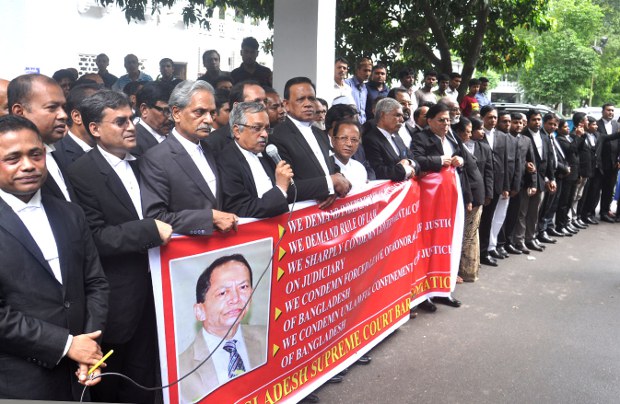Bangladesh’s Chief Justice to Face Corruption Probe: Officials
2017.10.16
Dhaka
 Members of the Bangladesh Supreme Court Bar Association form a human chain outside the High Court’s building in Dhaka to protest what they described as government interference in the judiciary’s independence, Oct. 9, 2017.
Members of the Bangladesh Supreme Court Bar Association form a human chain outside the High Court’s building in Dhaka to protest what they described as government interference in the judiciary’s independence, Oct. 9, 2017.
Bangladesh’s chief justice is facing allegations of corruption and moral turpitude, officials said, days after he left the country and expressed concerns over the judiciary’s independence while debunking government claims that he had taken ill.
The accusations against Surendra Kumar Sinha emerged after his own Supreme Court issued a rare statement on Saturday, confirming that President Abdul Hamid had called four judges to his palace on Sept. 30 and handed over 11 allegations of crimes against the chief justice.
On Sunday, Law Minister Anisul Haque said that the country’s Anti-Corruption Commission (ACC) would investigate the allegations levelled against Sinha, who flew to Australia on Friday night following a barrage of criticism from government officials.
“Nobody is above the law,” Haque told reporters. “These allegations will have to be investigated. Cases will be filed if the allegations are true.”
The Supreme Court’s statement said the four other judges of its Appellate Division had decided not to sit with Sinha at the top bench after the president had informed them of the alleged serious crimes.
“The allegations included money laundering, financial irregularities, corruption, moral turpitude and other specific serious allegations,” the statement said.
Sinha left amid reports that he had been pressured to go on a leave over the Supreme Court’s unanimous July 3 ruling that voided a constitutional amendment giving parliament authority to impeach judges.
Before leaving Dhaka on Friday, Sinha – the first Hindu chief justice in the Muslim-majority nation – told reporters outside his residence that he was “embarrassed” over the controversy surrounding his ruling.
He said he was “also a bit worried about freedom of the judiciary,” citing comments from Haque that acting chief justice Abdul Wahhab Miah would soon revamp the Supreme Court.
Sinha also refuted a comment from the law minister suggesting that the chief justice was taking one-month of sick leave because he had been stricken with cancer.
“I am not sick. I am quite OK. I am not escaping. I will come back again,” Sinha, 66, said, adding that he would resume his duties as chief justice before Nov. 10.
However, Attorney General Mahbubey Alam said Sinha’s return would lead to a stalemate, considering that the other senior judges had announced that they would not sit with him in court.
“Such a deadlock cannot go for an indefinite period. The judicial activities cannot be stopped,” Alam told BenarNews. “So, I think it is a far cry that he would return and discharge the duties as chief justice.”
Dispute over ruling
Sinha’s dispute with government officials, including Prime Minister Sheikh Hasina, grew after the High Court released its 799-page ruling in July.
Giving the legislature or executive branch the power to remove justices, Sinha wrote in the ruling, would contradict the constitutional principle that upholds equal separation of powers.
Afterwards Prime Minister Hasina accused Sinha of defaming the parliament and “humiliating” Bangladesh, suggesting that the chief justice “should have stepped down” before writing the court decision.
According to Minister Haque, Sinha’s comments in issuing the court’s decision belittled Sheikh Majibur Rahman, the nation’s founder and first president, particularly when the chief justice said that “no nation, no country is made of or by one person … we must keep ourselves free from this suicidal ambition.” Rahman, who was assassinated in 1975, is Hasina’s father.
Ataur Rahman, a retired political science professor at Dhaka University, said Sinha had become entangled in a clash between the country’s judiciary and a legislature controlled by the ruling Awami League party.
“The Chief Justice’s going abroad and levelling corruption charges against him will not bring any good outcome. This is because the whole episode would tarnish the image and of the judiciary in the end,” Rahman told BenarNews.
“Without an independent judiciary, attaining rule of law is impossible,” he said. “When there is no rule of law, there is no protection of the people’s rights.”







